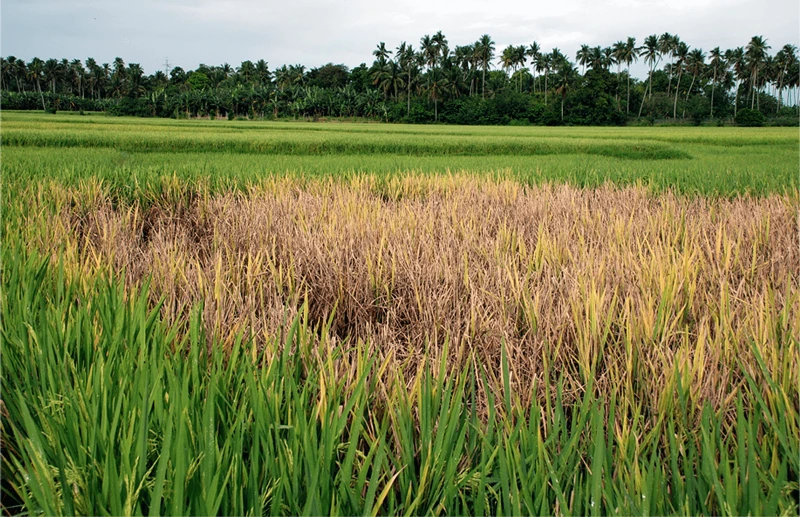Fighting crop diseases: Replacing crop chemicals by using gene-editing and other new breeding techniques
Fighting crop diseases: Replacing crop chemicals by using gene-editing and other new breeding techniques


Modern agriculture has encountered several challenges in achieving constant yield stability especially due to disease outbreaks and lack of long-term disease-resistant crop cultivars. In the past, disease outbreaks in economically important crops had a major impact on food security and the economy. On the other hand climate-driven emergence of new pathovars or changes in their host specificity further poses a serious threat to sustainable agriculture.
At present, chemical-based control strategies are frequently used to control microbial pathogens and pests, but they have detrimental impact on the environment and also resulted in the development of resistant phyto-pathogens. As a replacement, cultivating engineered disease-resistant crops can help to minimize the negative impact of regular pesticides on agriculture and the environment. Although traditional breeding and genetic engineering have been instrumental in crop disease improvement but they have certain limitations such as labour intensity, time consumption, and low efficiency. In this regard, genome editing has emerged as one of the potential tools for improving disease resistance in crops by targeting multiple traits with more accuracy and efficiency.
The use of genome editing methods has the potential to notably ameliorate crop disease resistance and transform agricultural practices in the future.
…
Despite the challenges and variability in success rates, the future outlook for genome editing-mediated disease resistance in plants is promising. Continued advancements in genome editing technologies, coupled with increasing knowledge of plant-pathogen interactions and genetic mechanisms underlying resistance, are expected to improve success rates and expand the range of target crops and pathogens. Furthermore, ongoing research efforts are focused on developing innovative strategies to enhance the efficacy and durability of edited resistance traits, such as combining genome editing with other breeding approaches like marker-assisted selection and RNA interference (RNAi), as well as leveraging synthetic biology tools to engineer novel resistance mechanisms. Overall, genome editing holds immense potential for revolutionizing plant disease resistance breeding by providing precise and sustainable solutions to combat pathogens, thereby contributing to global food security and agricultural sustainability.
This is an excerpt. Read the original post here

 | Videos | More... |

Video: Nuclear energy will destroy us? Global warming is an existential threat? Chemicals are massacring bees? Donate to the Green Industrial Complex!
 | Bees & Pollinators | More... |

GLP podcast: Science journalism is a mess. Here’s how to fix it

Mosquito massacre: Can we safely tackle malaria with a CRISPR gene drive?

Are we facing an ‘Insect Apocalypse’ caused by ‘intensive, industrial’ farming and agricultural chemicals? The media say yes; Science says ‘no’
 | Infographics | More... |

Infographic: Global regulatory and health research agencies on whether glyphosate causes cancer
 | GMO FAQs | More... |

Why is there controversy over GMO foods but not GMO drugs?

How are GMOs labeled around the world?

How does genetic engineering differ from conventional breeding?
 | GLP Profiles | More... |

Alex Jones: Right-wing conspiracy theorist stokes fear of GMOs, pesticides to sell ‘health supplements’




 Viewpoint — Fact checking MAHA mythmakers: How wellness influencers and RFK, Jr. undermine American science and health
Viewpoint — Fact checking MAHA mythmakers: How wellness influencers and RFK, Jr. undermine American science and health Viewpoint: Video — Big Solar is gobbling up productive agricultural land and hurting farmers yet providing little energy or sustainabilty gains
Viewpoint: Video — Big Solar is gobbling up productive agricultural land and hurting farmers yet providing little energy or sustainabilty gains Fighting deforestation with CO2: Biotechnology breakthrough creates sustainable palm oil alternative for cosmetics
Fighting deforestation with CO2: Biotechnology breakthrough creates sustainable palm oil alternative for cosmetics Trust issues: What happens when therapists use ChatGPT?
Trust issues: What happens when therapists use ChatGPT? 30-year-old tomato line shows genetic resistance to devastating virus
30-year-old tomato line shows genetic resistance to devastating virus California, Washington, Oregon forge immunization alliance to safeguard vaccine access against federal undermining
California, Washington, Oregon forge immunization alliance to safeguard vaccine access against federal undermining The free-range chicken dilemma: Better for birds, but with substantial costs
The free-range chicken dilemma: Better for birds, but with substantial costs ‘You have to treat the brain first’: Rethinking chronic pain with Sanjay Gupta
‘You have to treat the brain first’: Rethinking chronic pain with Sanjay Gupta
